Hubert Pham
REGEN: A Dataset and Benchmarks with Natural Language Critiques and Narratives
Mar 14, 2025Abstract:This paper introduces a novel dataset REGEN (Reviews Enhanced with GEnerative Narratives), designed to benchmark the conversational capabilities of recommender Large Language Models (LLMs), addressing the limitations of existing datasets that primarily focus on sequential item prediction. REGEN extends the Amazon Product Reviews dataset by inpainting two key natural language features: (1) user critiques, representing user "steering" queries that lead to the selection of a subsequent item, and (2) narratives, rich textual outputs associated with each recommended item taking into account prior context. The narratives include product endorsements, purchase explanations, and summaries of user preferences. Further, we establish an end-to-end modeling benchmark for the task of conversational recommendation, where models are trained to generate both recommendations and corresponding narratives conditioned on user history (items and critiques). For this joint task, we introduce a modeling framework LUMEN (LLM-based Unified Multi-task Model with Critiques, Recommendations, and Narratives) which uses an LLM as a backbone for critiquing, retrieval and generation. We also evaluate the dataset's quality using standard auto-rating techniques and benchmark it by training both traditional and LLM-based recommender models. Our results demonstrate that incorporating critiques enhances recommendation quality by enabling the recommender to learn language understanding and integrate it with recommendation signals. Furthermore, LLMs trained on our dataset effectively generate both recommendations and contextual narratives, achieving performance comparable to state-of-the-art recommenders and language models.
Beyond Retrieval: Generating Narratives in Conversational Recommender Systems
Oct 22, 2024
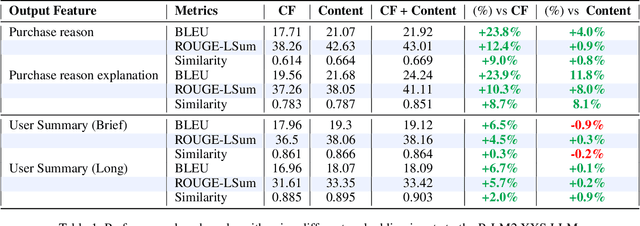


Abstract:The recent advances in Large Language Model's generation and reasoning capabilities present an opportunity to develop truly conversational recommendation systems. However, effectively integrating recommender system knowledge into LLMs for natural language generation which is tailored towards recommendation tasks remains a challenge. This paper addresses this challenge by making two key contributions. First, we introduce a new dataset (REGEN) for natural language generation tasks in conversational recommendations. REGEN (Reviews Enhanced with GEnerative Narratives) extends the Amazon Product Reviews dataset with rich user narratives, including personalized explanations of product preferences, product endorsements for recommended items, and summaries of user purchase history. REGEN is made publicly available to facilitate further research. Furthermore, we establish benchmarks using well-known generative metrics, and perform an automated evaluation of the new dataset using a rater LLM. Second, the paper introduces a fusion architecture (CF model with an LLM) which serves as a baseline for REGEN. And to the best of our knowledge, represents the first attempt to analyze the capabilities of LLMs in understanding recommender signals and generating rich narratives. We demonstrate that LLMs can effectively learn from simple fusion architectures utilizing interaction-based CF embeddings, and this can be further enhanced using the metadata and personalization data associated with items. Our experiments show that combining CF and content embeddings leads to improvements of 4-12% in key language metrics compared to using either type of embedding individually. We also provide an analysis to interpret how CF and content embeddings contribute to this new generative task.
Minimizing Live Experiments in Recommender Systems: User Simulation to Evaluate Preference Elicitation Policies
Sep 26, 2024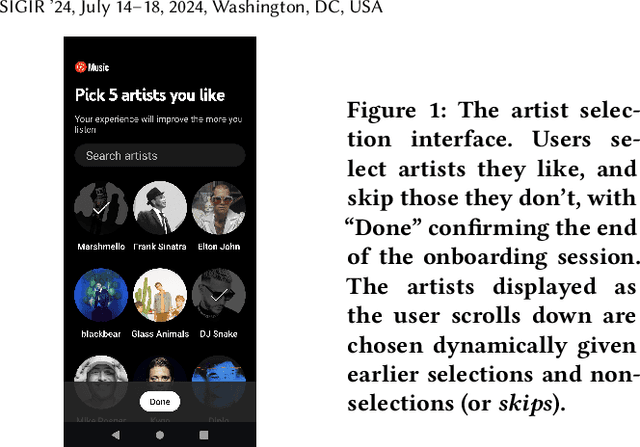

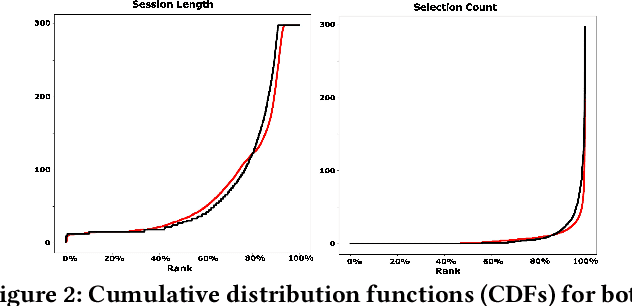
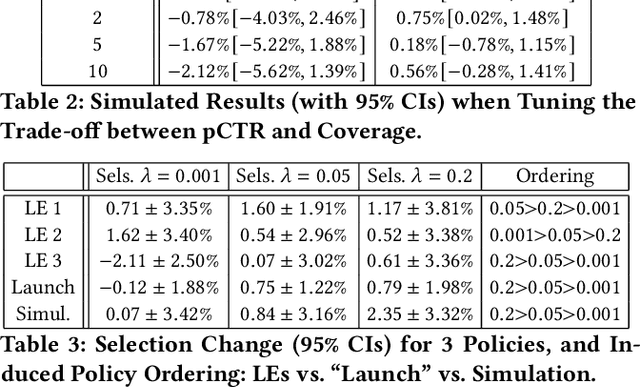
Abstract:Evaluation of policies in recommender systems typically involves A/B testing using live experiments on real users to assess a new policy's impact on relevant metrics. This ``gold standard'' comes at a high cost, however, in terms of cycle time, user cost, and potential user retention. In developing policies for ``onboarding'' new users, these costs can be especially problematic, since on-boarding occurs only once. In this work, we describe a simulation methodology used to augment (and reduce) the use of live experiments. We illustrate its deployment for the evaluation of ``preference elicitation'' algorithms used to onboard new users of the YouTube Music platform. By developing counterfactually robust user behavior models, and a simulation service that couples such models with production infrastructure, we are able to test new algorithms in a way that reliably predicts their performance on key metrics when deployed live. We describe our domain, our simulation models and platform, results of experiments and deployment, and suggest future steps needed to further realistic simulation as a powerful complement to live experiments.
FLARE: Fusing Language Models and Collaborative Architectures for Recommender Enhancement
Sep 18, 2024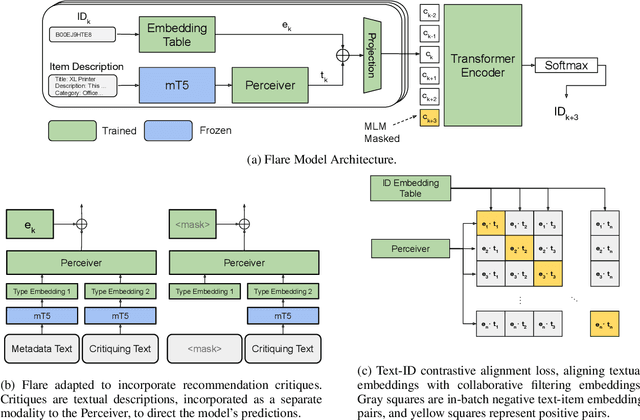


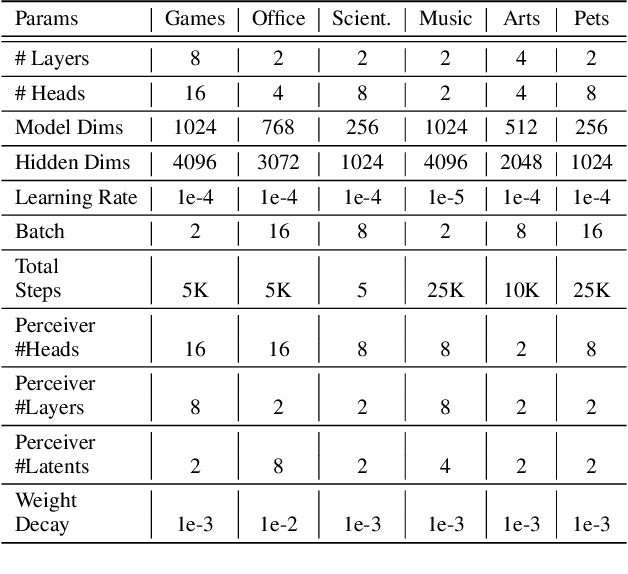
Abstract:Hybrid recommender systems, combining item IDs and textual descriptions, offer potential for improved accuracy. However, previous work has largely focused on smaller datasets and model architectures. This paper introduces Flare (Fusing Language models and collaborative Architectures for Recommender Enhancement), a novel hybrid recommender that integrates a language model (mT5) with a collaborative filtering model (Bert4Rec) using a Perceiver network. This architecture allows Flare to effectively combine collaborative and content information for enhanced recommendations. We conduct a two-stage evaluation, first assessing Flare's performance against established baselines on smaller datasets, where it demonstrates competitive accuracy. Subsequently, we evaluate Flare on a larger, more realistic dataset with a significantly larger item vocabulary, introducing new baselines for this setting. Finally, we showcase Flare's inherent ability to support critiquing, enabling users to provide feedback and refine recommendations. We further leverage critiquing as an evaluation method to assess the model's language understanding and its transferability to the recommendation task.
RecSim NG: Toward Principled Uncertainty Modeling for Recommender Ecosystems
Mar 14, 2021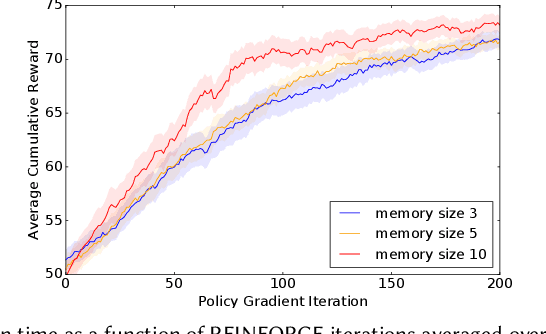
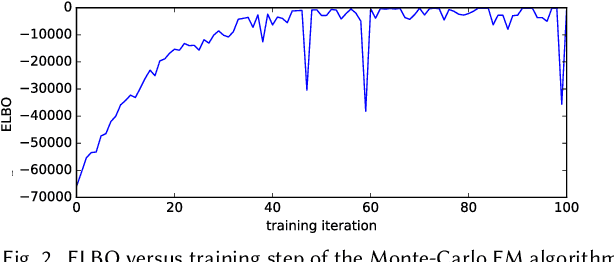
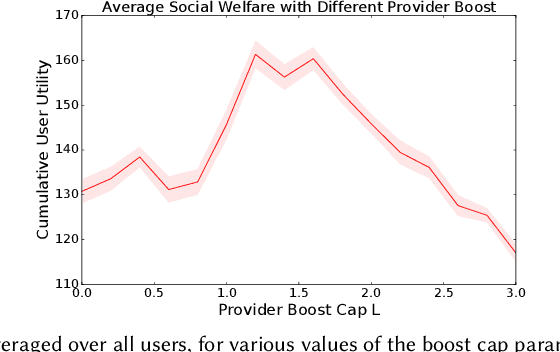
Abstract:The development of recommender systems that optimize multi-turn interaction with users, and model the interactions of different agents (e.g., users, content providers, vendors) in the recommender ecosystem have drawn increasing attention in recent years. Developing and training models and algorithms for such recommenders can be especially difficult using static datasets, which often fail to offer the types of counterfactual predictions needed to evaluate policies over extended horizons. To address this, we develop RecSim NG, a probabilistic platform for the simulation of multi-agent recommender systems. RecSim NG is a scalable, modular, differentiable simulator implemented in Edward2 and TensorFlow. It offers: a powerful, general probabilistic programming language for agent-behavior specification; tools for probabilistic inference and latent-variable model learning, backed by automatic differentiation and tracing; and a TensorFlow-based runtime for running simulations on accelerated hardware. We describe RecSim NG and illustrate how it can be used to create transparent, configurable, end-to-end models of a recommender ecosystem, complemented by a small set of simple use cases that demonstrate how RecSim NG can help both researchers and practitioners easily develop and train novel algorithms for recommender systems.
 Add to Chrome
Add to Chrome Add to Firefox
Add to Firefox Add to Edge
Add to Edge